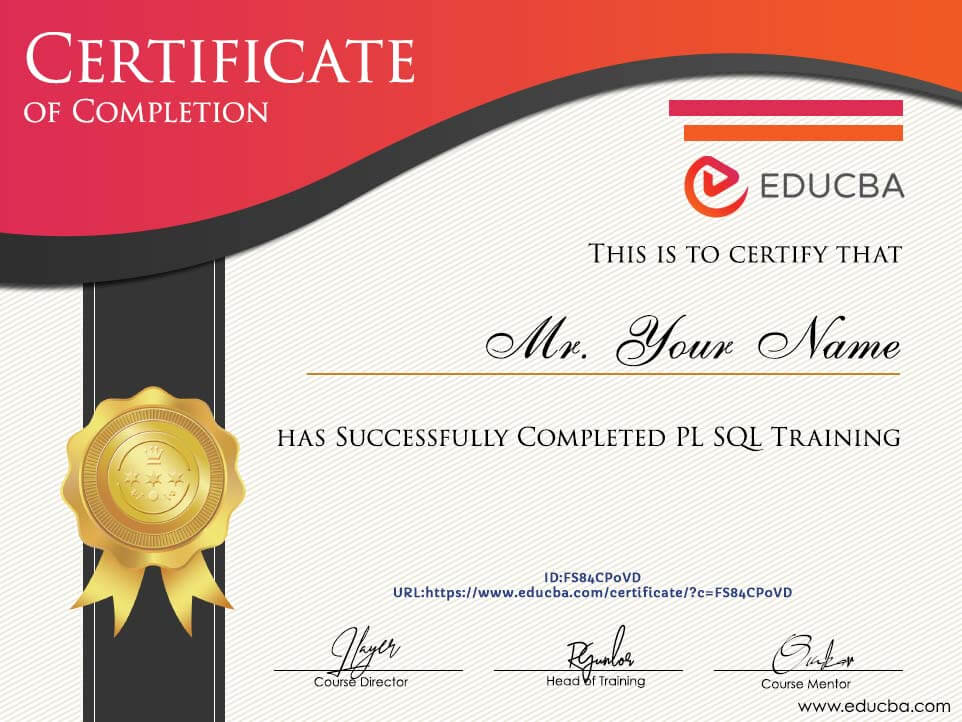Learn from Home Offer

PLSQL Course Bundle - 6 Courses in 1
This Online PL SQL Certification Training includes 6 Courses with 21+ hours of video tutorials and Lifetime access. You get to learn how to utilize the procedural language extension for SQL in the Oracle relational database.

* One Time Payment & Get Lifetime Access
What you get in this PLSQL Course Bundle - 6 Courses in 1?
21+ Hours
6 Courses
Course Completion Certificates
Lifetime Access
Self-paced Courses
Technical Support
Mobile App Access
Case Studies
About PLSQL Course Bundle
| Courses | You get access to all 6 courses, Projects bundle. You do not need to purchase each course separately. |
| Hours | 21+ Video Hours |
| Core Coverage | Learn how to utilize the procedural language extension for SQL in the Oracle relational database. |
| Course Validity | Lifetime Access |
| Eligibility | Anyone who is serious about learning relational database and wants to make a career in this Field |
| Pre-Requisites | Basic knowledge about Machine Learning would be preferable |
| What do you get? | Certificate of Completion for each of the 6 courses, Projects |
| Certification Type | Course Completion Certificates |
| Verifiable Certificates? | Yes, you get verifiable certificates for each course with a unique link. These link can be included in your resume/Linkedin profile to showcase your enhanced data analytics skills |
| Type of Training | Video Course – Self Paced Learning |
PLSQL Course Bundle Curriculum
In this section, each module of the PL SQL Training Course is explained.
-
MODULE 1: Essentials Training
Courses No. of Hours Certificates Details Oracle PLSQL for Beginners 3h 24m ✔ Oracle PLSQL - Procedures and Functions 3h 15m ✔ Oracle PLSQL - Subprograms 3h 52m ✔ Oracle PLSQL - Database Triggers 3h 12m ✔ -
MODULE 2: Projects based Learning
Courses No. of Hours Certificates Details Project on PLSQL Developer - Case Study on Various Functions 3h 05m ✔ Project on PLSQL Developer - Case Study 5h 24m ✔
Goals
The PL SQL from EduCBA is designed in such a way that the gap between the ask from the industry and current skill of people are taken into consideration and hence aim to provide best in class theoretical concepts to bridge this gap and imbibe confidence for tackling the toughest of the business cases with ease.
Objectives
This course on PL SQL will expose you to the best of theoretical concepts and as well advanced and latest technological area of the topic. Leaving aside the concepts the main objective of any course from EduCBA, including the one we are going to look right now, PL SQL, is to constantly have the quest to improvise on yourself, the processes you take in day to day work and hence allow you to be the motivator of increasing engagement in work. The bunch of courses in EduCBA has a wide range of topic starting from beginner’s introduction to PL SQL to advanced concepts like Database triggers.
Course Highlights
Any of the courses designed by EduCBA are taken the care that needs to be taken for designing a course. Every article is prepared meticulously so that any learner, either beginner or an advanced learner are benefitted in the ways they expect to benefit themselves through our courses. Some key highlights of the course are as follows:
- At first we would start with an introduction to PL SQL, which will introduce PL SQL for the beginners and would be a refresher for the advanced learners. In this portion, we would understand what variables, executable statements, control structure in PL SQL are. Then we would study how to declare a variable and more importantly the interaction with Oracle.
- We would also look at managing PL SQL subprograms, triggers, declaring identifiers and execution trapping, and create overloaded package programs for more flexibility.
- When we jump on to the next portion, we would learn about writing explicit cursors, the creation of procedures, and functions created. Cursors are a pointer to a context area and hold the information which is returned after execution of the statements. Procedures are the block that performs one or more specific tasks.
- In the next tutorials, we would learn how to manage subprograms where we would learn about privileges, invoker rights along with learning about user source, user error, and ways of debugging.
- We would then learn about concepts of creating packages where we would learn about concepts of overloading, forward declaration, packaging concepts, and many such more. Once this is completed, we would learn ways of manipulation of large objects like using internal LOBs which are data types that are stored inside database tablespaces which allows the program to optimize space and enable efficient access.
Project Highlights
The course in PL SQL not only deals with theoretical concepts but does include the techniques on allowing learners to understand the proper channel through which they can deploy the learned concepts, i.e. through projects. The convenience of learning through the project is what we have taken on our stride and we try to put in a maximum of effort to make it successful. Some of the project highlights are:
- From the highlights of the theory described in the previous section, we have a concise idea of what the course is going to look like from a theoretical standpoint. Now here we will try to have a look at the highlights from the project point of view where we would be expecting to chime in what we learned in theory to project.
- In the first project we would go through the case study of different functions we have in place for PL SQL. Initially we would start with an idea of what functions are and what use of it is in store for learners of PL SQL and then we have a range of 6 tutorials where we will have case studies on the functions we have learned in the theory classes of this course.
- In the second project as well we have a case study focusing on all the aspects we have gone through in the theory and try to deep dive into the working principle of every terminology of the concepts and imbibe a sense of thinking out of the box solutions in each scenario!
- This project is a full-fledged project which is broken down into 10 parts for complete and easy understanding.
PL SQL Training – Certificate of Completion
What is PLSQL Programming?
- PL/SQL is Oracle Corporation’s extension of for handling SQL queries and the Oracle relational databases. The PL/SQL is somewhat similar to the SQL query language with the difference being that it provides Programming Language constructs that are generally not present inside the Structured Query Language. This is done as it provides loops, conditions, variables, constants, functions and procedures, triggers and cursors, etc. All this was introduced because of the drawbacks of the SQL language such as lack of conditional and iterative statements. Therefore this procedural language was used to handle the programming aspects which also provides the functionality of decision making.
- Program units are the source codes of PL/SQL which are compiled, developed, and finally executed on the Oracle database. The basic unit of a PL/SQL statement is a block which is a combination of statements and declarations. It can be defined by keywords such as DECLARE, BEGIN, EXCEPTION, and END. The keywords work in dividing the block into declarative, executable as well as the exception-handling part. However, the declaration section provided is optional and may only be used to define and instantiate constants and variables.
Industry Growth Trend
The rapid application development market size is expected to grow from USD 7.8 billion in 2018 to USD 46.2 billion by 2023, at a Compound Annual Growth Rate (CAGR) of 42.9% during the forecast period.[Source - MarketsandMarkets]
Average Salary
[Source - Indeed]
Which tangible skills you will learn in this course?
If you choose to opt for the PL/SQL course online the first and foremost skill you will learn will be related to database and a query language which is a mandate if you plan to start your career in the IT space or are working as some professional already. The structured query language is the basic query language that is used to fetch, manipulate, and work on the data extracted and managed by a database. The other skillset which you will learn in this PL SQL training will be related to the programming constructs as the Procedural language provided will make use of the conditional as well as the iterative statements along with several other triggers and cursors which will enhance your skillset.
Pre-requisites
- Once you are interested in taking the PL SQL Programming training course there are a set of pre-requisites of which you should make a note before hopping in.
-
- The first and foremost prerequisite is to have a familiarity with the backend system especially the role and the functioning of the databases which are being used inside the organization. Gone are those days when only the relational databases were used for storing the data. Today there are several other kinds of databases present in the market such as NoSQL databases like MongoDB, Cassandra, etc.
- The next prerequisite is familiarity for programming languages. This is important as the Procedural language will make use of many such features which requires a background of programming
- The next prerequisite is to have customer-centric thinking as this will be beneficial to the end customer.
Target Audience
- The target audience for PL/SQL training course would be anybody who has the zeal to learn and is looking to either make a career shift into the PL/SQL technology or is looking to enhance their skill set. The audience can also include professionals, professors, students, etc. Among the professionals working in the IT industry or any software firm below is the list of the roles who will be the ideal target audience for the PL/SQL course online:
- Developer (Forms, backend, database, application, portal)
- Database Engineer
- Data Engineer
- Database Administrators
- System analysts
- Business Analyst
- Product Owner
- Technical Consultant
- PL/SQL developer
- Testers
FAQs
Is it tough for somebody who does not have a coding background to learn the PL/SQL programming training?
Not exactly. You don’t need to have a coding background to learn the PL/SQL programming course online but only that you should be familiar with programming constructs. You should not be proficient in writing code snippets is agreeable but not able to understand the coding constructs can pose a problem for you.
Do I need to keep practicing or just one time learning of PL/SQL training course is enough?
We would recommend you to keep practicing as this PL SQL training is not something which is only conceptual or theoretical based but it also relates to everything related to a programming language that needs a regular revision and a working hands-on.
Sample Preview
Career Benefits
-
- This course provides you everything you need to know as a developer, the backend development, and
-
- also the coding paradigms so any company which deals with data, (essentially every company today) will
-
- look to hire candidates who know PL/SQL. RDBMS are still the backbone of most of the
- organizations and therefore SQL is the way to go for.
Reviews

Database Management Course
The course is very helpful as it has a complete video with an example description. The teaching and explanation are good at each stage with examples. good experience of learning through this course.
UMESH KUMAR C HIREMATH

The course PHP & MySQL – The Ultimate Web Development Training
It is useful for these users who would like to start use programming language PHP, to install it and to know the most important operations, functions. There you can find the basics of the programming language PHP and start creating your first web page.
Linked
Lina Kankevičienė

Nice Experience
I enjoyed the course and learned a lot. The videos were amazing.
Linked
George Kwofie

Good training
User Interface of the website is good which made me set targets and complete the course within planned time. It was easy to complete the course and each video was of appropriate length because lengthy videos make learning boring. I feel, It would be better if practice exercises are added to the course which can make a learner learn things more effectively.
As a whole it was good.
Linked
MANDEEP SUSHANT KUMAR JOJO

PHP and MySQL Training
The course covers topics such as File Handling, Cookies, and Sessions. A detailed explanation is provided by the instructor. The slides were really good. With the lessons I learned, now I can build more dynamic web applications using PHP.
Linked
Tafadzwa Makuyana




